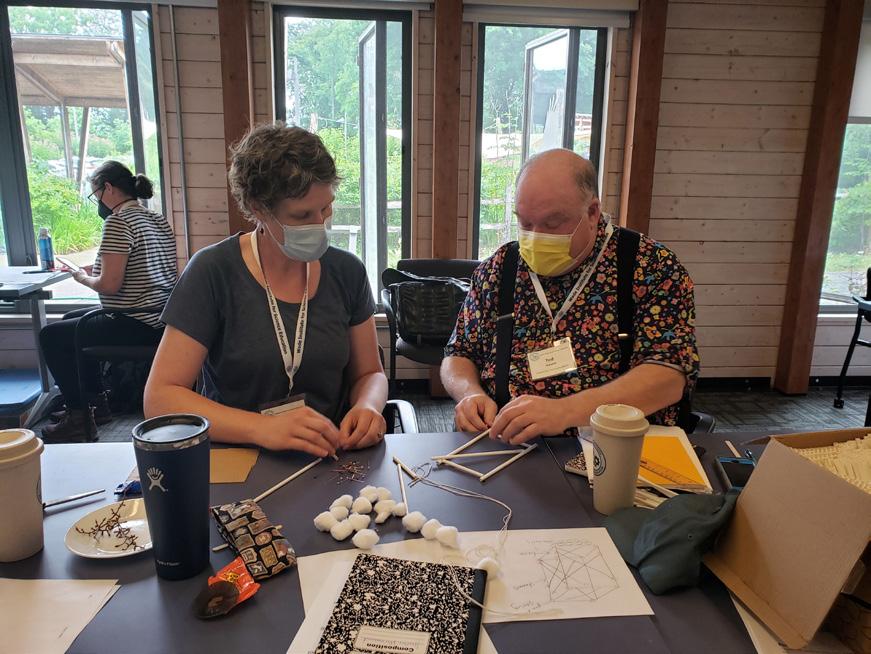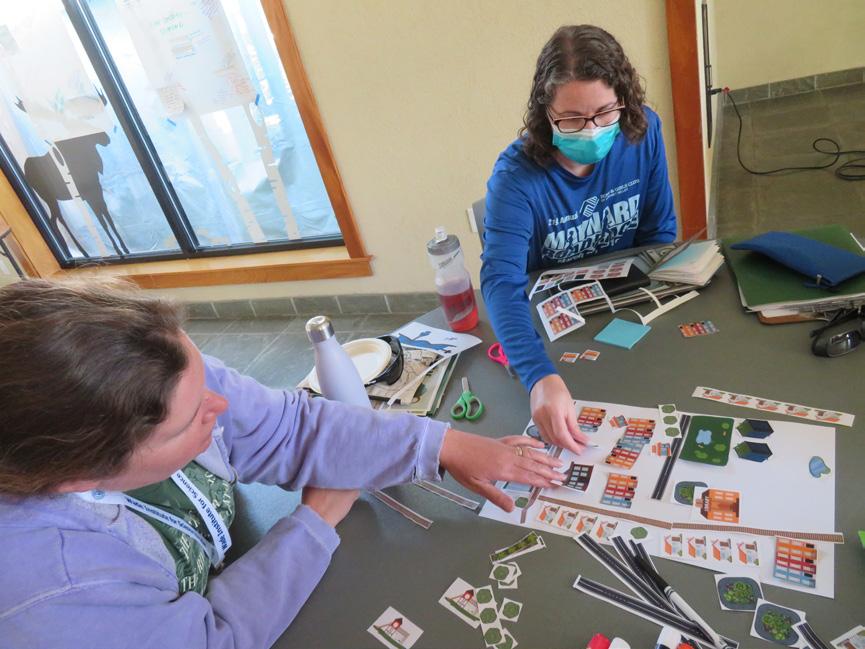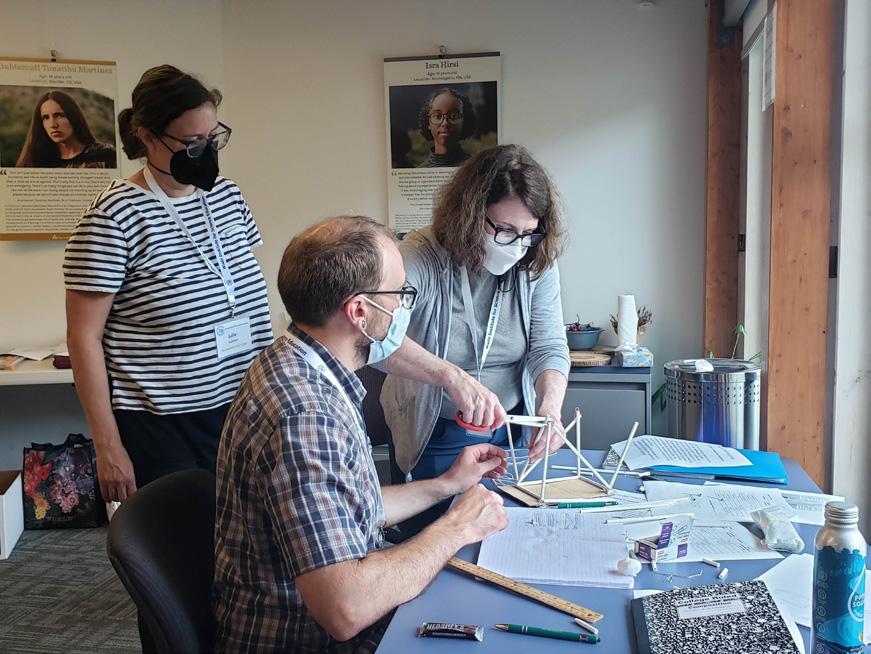
4 minute read
Their Summer Fun to Burnout ”
This summer National Grid Foundation generously supported the Wade Institute’s Summer Professional Development Institutes which immerse teachers in handson, minds-on, inquiry-based science learning through community collaborations with educators, scientists, engineers, and STEM providers such as museums, nature centers, science centers, and higher education institutions. Educators participate in inquiry-based investigations as student learners, enhance their understanding of upto-date teaching practices and science content, adapt their lessons to be more studentdriven, gain access to inquiry-based investigations that they can use in their classrooms, and connect with local organizations that can be resources for them throughout the year. The 2022 Summer Professional Development Institutes brought together educators from across Massachusetts for week-long professional learning opportunities in the Central, Southeast, and Pioneer Valley regions of the state.
During the Central Region institute, Nature and Design: Connections Between Science, Edngineering and the Natural World, educators delved into the concepts of green design and biomicry. They took an up-close look at sustainable building design features, such as rain gardens and solar fields and learned how the Blackstone River Valley National Heritage Corridor’s LEED certified building’s design connects the building to its past while drawing on and preserving the natural landscape.
Advertisement
“I’m excited to potentially create a rain garden (student designed and created) outside the gym,” a Waltham school teacher commented after the visit. Educators applied their new knowledge to a water wheel engineering design challenge, which a Scituate Public Schools teacher described as “ a fun challenge. This is an activity I might adopt for my class.” They learned from a variety of guest speakers who shared information on rain gardens, the Blackstone River watershed, and the Worcester Green Plan.
“I’m thinking about ways to use the natural (and human!) resources nearby to create new, engaging and inquiry-based units and/or lessons. Connecting science to my students’ surroundings when possible will make it so much more meaningful,” said a Worcester
Public Schools teacher reflecting on the experience.
Educators learned how to integrate field research and real time data into their science curriculum during the Southeast Region institute, Utilizing Your Local Ecosystems as Laboratories for Investigations. They investigated the ecological impacts of food sources and observed how the interactions of pollinators, plants, and animals support the health of the farmyard ecosystem at Round the Bend Farm.
“I really enjoyed hearing about and thinking about all the interconnections between the various elements of the Round the Bend Farm. It was a good model of ecological relationships,” said an Easton Public Schools teacher, and her teammate commented that “It was great to relate content to experiential learning.” At the Lloyd Center for the Environment, educators identified marine life, and examined how the soil in the salt marsh compares with the sediment of a coastal ecosystem to that of a farm. A Somerset Public Schools teacher said that the highlight of the experience was “exploring the beach in search of clams, snails, mollusks and other types of sea life that washed ashore.” As a way to further explore ecosystems, the group participated in site surveys designed to determine whether parcels of land were best valued and used for preservation or for construction or other purposes. “I can definitely see doing this with my students and it’s so much more dynamic and full of student choice than just running a transect and having them each analyze a quadrant along the length,” said a Concord-Carlisle Regional School District teacher.
Educators explored integrations of math and science as they gathered evidence of the Pioneer Valley’s rich history of geologic change during the institute Rivers to Range: Exploring the Geology of the Pioneer Valley. They searched the modern landscape for clues to a very different past and gained access to resources that they can use in their classroom in the year ahead. “Thinking about connecting it all together for students makes sense when thinking about how the history and geology of the earth intersect,” said a Springfield

Public Schools teacher. “I’m excited not only for my teaching practice, but also to live in the Pioneer Valley having this new understanding of its geological history!”
Educators investigated erosion and plate tectonics at the Springfield Science Museum, identified types of rocks and placed them on a geologic time scale, and searched for dinosaur footprints at The Trustees of Reservations Dinosaur Footprints. They designed their own dinosaur tracks with an ichnology expert from the Beneski Museum of Natural History and engineered and tested earthquake-proof building models at the Hitchcock Center for the Environment. A Salem Public Schools teacher said, “I loved seeing the dinosaur tracks in situ as well as being able to see the angle or uplift of the sediment. The class discussion led by Fred [Venne] brought it to life and allowed me to understand what I was seeing. Returning to the Beneski [Museum] was another highlight.” A Worcester private school teacher noted that the experience helped her to better understand how the region was formed by providing “an overview picture of the process.”
Time and again, the Wade Institute proves that in-depth exploration of science content and the science of teaching (pedagogy) can be fun! One teacher described the institute as a re-energizing “really great antidote to burnout!!” Other educators felt that “the speakers were inspiring and the activities were fun!” and that the course was a “very well-paced, thoughtful, interactive week. Really awesome PD! I have little techniques, big picture things, and personally interesting information to bring back to my teaching and my life.” “I am thinking a lot about how to make my lessons more engaging and more authentic as a result of today’s activities,” said an Easton Public Schools teacher, “I am also thinking of how to integrate phenomena learning into my classroom. I see how cool it is and how good it could be for engagement and learning.”
As a foundation that cares about strengthening community and enabling STEM skills development through training, the National Grid Foundation has sponsored the Wade Institute for Science Education’s Summer Professional Development Institutes for five years. ❧










